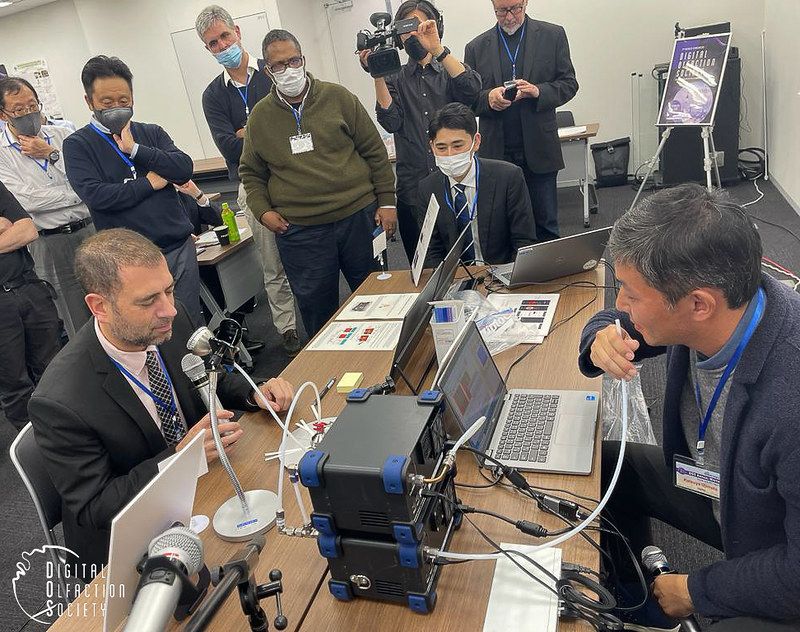Imagine a world where the unique scents of cities—from the bustling streets of Tokyo to the aromatic markets of Marrakesh—are preserved and shared digitally. The Digital Olfaction Society (DOS) is pioneering this very concept, leading an ambitious global project to capture and archive the scents of diverse locations, but they need your help.
The Digital Olfaction Society (DOS), an organization focused on advancing olfactory technology and digital scent communication, is leading an exciting global initiative to capture and recreate the scents of cities worldwide, bringing these olfactory experiences to life in Tokyo. This innovative project aims to digitally archive and reproduce the distinctive scents of various locations, offering a novel way to explore global cultures through the power of smell.
But why is capturing scents important from a cultural perspective? This research and program are poised to usher in a new era of olfactory digitization, combining advanced technology with the preservation of cultural heritage. It’s not just about recording scents; it’s about safeguarding the essence of diverse cultures, a collective responsibility we can all share and take pride in.
“DOS believes scents are deeply tied to cultural practices, memories, and traditions,” says Prisca Gebrayel from The Digital Olfaction Society. “By digitizing and preserving unique scents from different regions, we can safeguard an often-overlooked aspect of cultural identity.”


“For instance, traditional foods, local environments, and even ceremonial fragrances can be digitally preserved and shared, ensuring that future generations have access to these olfactory experiences. DOS sees this as contributing to a more comprehensive preservation of cultural heritage, adding an immersive sensory dimension to the documentation of traditions.”
Olfactory digitization refers to the process of converting smells into digital data. The technology involves sensors and devices that analyze and identify the chemical compounds in a scent, which are then translated into a digital representation using algorithms.
Interdisciplinary collaborations play a vital role in the success of this scent digitization project. “Neuroscience helps us understand how humans perceive and process smells, which is essential for accurately recreating them,” Gebrayel says. “Chemistry plays a key role in analyzing and breaking down complex scent molecules into a format that can be digitized.”
She adds, “AI enhances the project by processing scent data, recognizing patterns, and improving the accuracy of scent reproduction. DOS emphasizes that these collaborations ensure both technological advancement and a deeper understanding of olfactory science as a whole.”
Every city has its unique scent—diverse and often reflective of its local culture and environment.
Matthew Cobb, a professor of zoology at the University of Manchester, explores the social, political, and historical significance of scent in his book, Smell: A Very Short Introduction. In Chapter 6, titled “Smell in Culture,” Cobb discusses how scent has played a role in literature, political narratives, and even rituals since prehistoric times. Perfumes were once used in ceremonies and believed to protect against illness or evil spirits, but today, they are a part of daily life. Yet, scent has also served as a tool for political division, reinforcing separations between ethnic groups and social classes.
Looking ahead, DOS is exploring the potential applications of scent in areas such as urban planning, healthcare, and even space exploration. For example, they are considering how the distinct atmospheric composition of Mars might influence its smell.
“DOS identifies several applications for scent digitization beyond cultural transmission,” Gebrayel says. “In healthcare, it could be used for diagnosing and monitoring conditions, as scent can indicate certain diseases. DOS also points to the potential use of scent in therapeutic settings, such as aromatherapy, for stress relief or mental health treatments. In retail, the technology could enhance customer experiences by allowing users to ‘smell’ products online, such as perfumes or food, before purchasing.”
Additionally, “DOS notes that incorporating scents into virtual reality could significantly enhance the realism of immersive experiences, transforming entertainment, education, and training simulations.”
Of course, there are challenges to be overcome. Reaching this level of technological sophistication requires time and the use of advanced methods. According to Gebrayel, “Unlike images or sounds, scents are chemically complex and involve hundreds of volatile compounds that interact with human olfactory receptors in highly individualized ways. The main challenge in digitizing scents lies in capturing and accurately encoding these complex molecular signatures into digital data that can be reproduced elsewhere.”
“Recreating these scents with precision is difficult, as the human nose is sensitive to even slight variations in scent composition,” Gebrayel explains. “Additionally, DOS highlights the challenges of developing reliable transmission methods and creating devices capable of recreating scents in real-time—an added complexity compared to transmitting images or sounds.”
DOS is inviting teams and experts worldwide to contribute by digitizing the scents that represent the cultural essence of their regions. Whether from major cities like Berlin and New York or locales with distinctive aromas, contributors will play a vital role in building a vast digital scent archive.
A dedicated team in Tokyo will work to faithfully reconstitute these digital scent signatures, with the final technology reveal scheduled for 2025.
This challenge presents a unique opportunity for cities to showcase their cultural heritage. DOS encourages experts and teams to contact them at dos@digital-olfaction.com for more information.
Chrissy Newton is a PR professional and founder of VOCAB Communications. She currently appears on The Discovery Channel and Max and hosts the Rebelliously Curious podcast, which can be found on The Debrief’s YouTube Channel on all audio podcast streaming platforms. Follow her on X: @ChrissyNewton and at chrissynewton.com.

